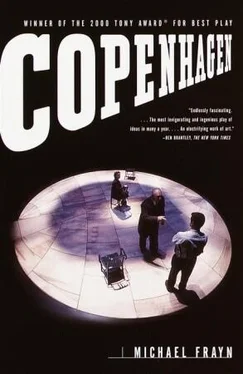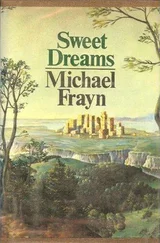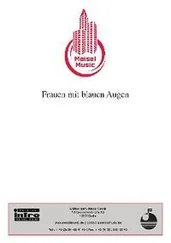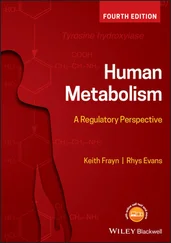Margrethe I shouldn’t let you sit anywhere near each other, if I were the teacher.
Heisenberg And that’s when I did uncertainty. Walking round Faelled Park on my own one horrible raw February night. It’s very late, and as soon as I’ve turned off into the park I’m completely alone in the darkness. I start to think about what you’d see, if you could train a telescope on me from the mountains of Norway. You’d see me by the street-lamps on the Blegdamsvej, then nothing as I vanished into the darkness, then another glimpse of me as I passed the lamp-post in front of the bandstand. And that’s what we see in the cloud chamber. Not a continuous track but a series of glimpses — a series of collisions between the passing electron and various molecules of water vapour.… Or think of you, on your great papal progress to Leiden in 1925. What did Margrethe see of that, at home here in Copenhagen? A picture postcard from Hamburg, perhaps. Then one from Leiden. One from Göttingen. One from Berlin. Because what we see in the cloud chamber are not even the collisions themselves, but the water-droplets that condense around them, as big as cities around a traveller — no, vastly bigger still, relatively — complete countries — Germany … Holland … Germany again. There is no track, there are no precise addresses; only a vague list of countries visited. I don’t know why we hadn’t thought of it before, except that we were too busy arguing to think at all.
Bohr You seem to have given up on all forms of discussion. By the time I get back from Norway I find you’ve done a draft of your uncertainty paper and you’ve already sent it for publication!
Margrethe And an even worse battle begins.
Bohr My dear good Heisenberg, it’s not open behaviour to rush a first draft into print before we’ve discussed it together! It’s not the way we work!
Heisenberg No, the way we work is that you hound me from first thing in the morning till last thing at night! The way we work is that you drive me mad!
Bohr Yes, because the paper contains a fundamental error.
Margrethe And here we go again.
Heisenberg No, but I show him the strangest truth about the universe that any of us has stumbled on since relativity — that you can never know everything about the whereabouts of a particle, or anything else, even Bohr now, as he prowls up and down the room in that maddening way of his, because we can’t observe it without introducing some new element into the situation, a molecule of water vapour for it to hit, or a piece of light — things which have an energy of their own, and which therefore have an effect on what they hit. A small one, admittedly, in the case of Bohr …
Bohr Yes, if you know where I am with the kind of accuracy we’re talking about when we’re dealing with particles, you can still measure my velocity to within — what …?
Heisenberg Something like a billionth of a billionth of a kilometre per second. The theoretical point remains, though, that you have no absolutely determinate situation in the world, which among other things lays waste to the idea of causality, the whole foundation of science — because if you don’t know how things are today you certainly can’t know how they’re going to be tomorrow. I shatter the objective universe around you — and all you can say is that there’s an error in the formulation!
Bohr There is!
Margrethe Tea, anyone? Cake?
Heisenberg Listen, in my paper what we’re trying to locate is not a free electron off on its travels through a cloud chamber, but an electron when it’s at home, moving around inside an atom …
Bohr And the uncertainty arises not, as you claim, through its indeterminate recoil when it’s hit by an incoming photon …
Heisenberg Plain language, plain language!
Bohr This is plain language.
Heisenberg Listen …
Bohr The language of classical mechanics.
Heisenberg Listen! Copenhagen is an atom. Margrethe is its nucleus. About right, the scale? Ten thousand to one?
Bohr Yes, yes.
Heisenberg Now, Bohr’s an electron. He’s wandering about the city somewhere in the darkness, no one knows where. He’s here, he’s there, he’s everywhere and nowhere. Up in Faelled Park, down at Carlsberg. Passing City Hall, out by the harbour. I’m a photon. A quantum of light. I’m despatched into the darkness to find Bohr. And I succeed, because I manage to collide with him.… But what’s happened? Look — he’s been slowed down, he’s been deflected! He’s no longer doing exactly what he was so maddeningly doing when I walked into him!
Bohr But, Heisenberg, Heisenberg! You also have been deflected! If people can see what’s happened to you, to their piece of light, then they can work out what must have happened to me! The trouble is knowing what’s happened to you! Because to understand how people see you we have to treat you not just as a particle, but as a wave. I have to use not only your particle mechanics, I have to use the Schrödinger wave function.
Heisenberg I know — I put it in a postscript to my paper.
Bohr Everyone remembers the paper — no one remembers the postscript. But the question is fundamental. Particles are things, complete in themselves. Waves are disturbances in something else.
Heisenberg I know. Complementarity. It’s in the postscript.
Bohr They’re either one thing or the other. They can’t be both. We have to choose one way of seeing them or the other. But as soon as we do we can’t know everything about them.
Heisenberg And off he goes into orbit again. Incidentally exemplifying another application of complementarity. Exactly where you go as you ramble around is of course completely determined by your genes and the various physical forces acting on you. But it’s also completely determined by your own entirely inscrutable whims from one moment to the next. So we can’t completely understand your behaviour without seeing it both ways at once, and that’s impossible. Which means that your extraordinary peregrinations are not fully objective aspects of the universe. They exist only partially, through the efforts of me or Margrethe, as our minds shift endlessly back and forth between the two approaches.
Bohr You’ve never absolutely and totally accepted complementarity, have you?
Heisenberg Yes! Absolutely and totally! I defended it at the Como Conference in 1927! I have adhered to it ever afterwards with religious fervour! You convinced me. I humbly accepted your criticisms.
Bohr Not before you’d said some deeply wounding things.
Heisenberg Good God, at one point you literally reduced me to tears!
Bohr Forgive me, but I diagnosed them as tears of frustration and rage.
Heisenberg I was having a tantrum?
Bohr I have brought up children of my own.
Heisenberg And what about Margrethe? Was she having a tantrum? Klein told me you reduced her to tears after I’d gone, making her type out your endless redraftings of the complementarity paper.
Bohr I don’t recall that.
Margrethe I do.
Heisenberg We had to drag Pauli out of bed in Hamburg once again to come to Copenhagen and negotiate peace.
Читать дальше












